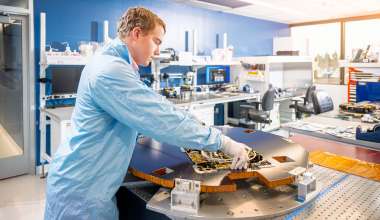As the space enterprise continues to expand in scope and accelerate in pace of development, institutions face the reality that merely possessing large quantities of important data is no longer sufficient if it cannot be aggregated, analyzed and presented in a prompt and meaningful manner.
Demonstrating a new approach to data integration for informed and timely decision making, Aerospace utilized a prototype platform, the Integrated Digital Engineering Prototype Testbed Hub (InDEPTH), to combine data from across a complex system of systems and present detailed scenarios through integrated, data-driven simulations, analysis and visualizations to support critical stakeholder decisions.
An InDEPTH Analysis
Accurate weather observations and forecasts are of vital importance to Joint Services operators, who join forces with civil agencies and international partners to ensure the warfighter is equipped with the best information available. The 2019 Capability Area Strategy Review undertaken by Air Force Space Command (AFSPC) attempted to knit together the capabilities and requirements across three government agencies and in the process, illustrated how legacy data and information management and communication processes are insufficient to support the scale and pace of next-generation enterprises.
Decision makers were challenged to make sense of a mountain of complex data and information compiled from three separate enterprise architectures. In determining a strategic path forward, Aerospace’s support was sought, given the FFRDC’s technical expertise and experience bridging military and civil space.
Anticipating an emerging need of this nature, a team at Aerospace had already been working on InDEPTH, which leverages digital engineering principles to enable unified data integration and analysis across disparate systems and enterprises. The Space-Based Environmental Monitoring (SBEM) review provided an opportunity to demonstrate the value of this modern approach to enterprise-level data integration.
“There’s an ongoing need from government customers to demonstrate the value of digital engineering. The specific needs of the SBEM mission area became the exemplar that strengthened the proof of concept for our digital engineering testbed,” said Dean Bucher, Principal Director of Digital Engineering Integration at Aerospace. “It allowed us to tackle a real-world problem that demanded the ability to streamline and digitally evaluate different options in a much more seamless way than traditional methods allow.”
Establishing a Source of Truth
The team collected data from all three agencies and ingested it into InDEPTH, creating a case study using the same data available to decision makers, managed within a digital engineering paradigm, to allow leaders access to insights from across the enterprise.
The team demonstrated how a digital engineering approach would have enabled decision makers to understand the knock-on effects of a loss of capability, as well as the strategies available to mitigate these effects, across the SBEM mission area in a matter of hours.
Aerospace demonstrated the value and necessity of a different approach to enterprise data integration and analysis for government customers. This modern method could significantly reduce the complexity of future stakeholder reviews, expediting the process and yielding richer insights.
The demonstration immediately led to follow-up studies looking to expand the testbed to encompass a variety of new test cases across Aerospace’s customer base and integrate a number of modeling and simulation capabilities for enterprise-level analysis.
Applications for Digital Engineering
“Weather was the first InDEPTH pathfinder used to stand up the DE testbed’s capabilities,” Bucher said. “We’re looking at more mission areas to see how we can apply this approach to address the needs of organizations across defense, civil and commercial space.”
Digital engineering enabled the rapid, unified data integration and analysis necessary to keep up with the accelerating pace of space development. Aerospace, with its ties to a multitude of customers across the spectrum of space activity, stands in a unique position to facilitate the transition to this new digital engineering paradigm.
“For some, digital engineering and its potential had primarily been conceptual, existing only in discussions and presentations without tangible examples of its application. There was not really anything in practice to help better understand the new possibilities it could enable,” Bucher said. “With InDEPTH, we wanted to demonstrate the value of digital engineering in practice, and this is just the beginning.”
This is article is part of the Delivering Value collection, which highlights stories and accomplishments that exemplify Aerospace’s corporate values in action in support of our customers across the space enterprise.








